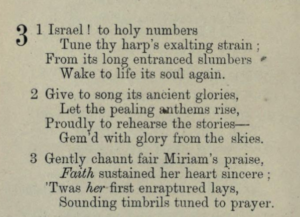Contributor(s): Shared on: 14 October 2021 under the Creative Commons Zero (CC 0) Universal license a Public Domain dedication Categories: Tags: | Contribute a translation | Source (English) |
|---|
|
Israel! to holy numbers
Tune thy harp’s exalting strain;
From their long entranced slumbers,
Wake to life its soul again. | |
Give to song its ancient glories,
Let the pealing anthems rise,
Proudly to rehearse the stories—
Gem’d with glory from the skies. | |
Gently chaunt fair Miriam’s praise,
Faith sustained her heart sincere
‘Twas her first enraptured lays,
Sounding timbrels tuned to prayer. | |
Rejoicing went the welcome song,
As up to heaven it rose,
Sweet Spirits would the sound prolong—
Half wakening from repose. | |
Almighty God! before this shrine,
Man his Maker worships free!
O! bless it with thy love Divine,
Fill it with thy charity. | |
God is Eternal—and alone!
Humbly let us bend the knee,
While Seraphs guard his sacred throne,
Linking immortality. |
“Israel! to holy numbers tune thy harp’s exalting strain,” by Columbus Moïse (1809-1871), was first delivered in 1842 as part of the consecration of the new synagogue building for Ḳ.Ḳ. Beth Elohim and published that year in the congregation’s hymnal. It appears as Hymn 3 in Hymns Written for the Service of the Hebrew Congregation Beth Elohim, South Carolina (Penina Moïse et al., Ḳ.Ḳ. Beth Elohim, 1842), p. 8. Columbus Moïse was said to have composed a poem for the inauguration of the “Portuguese synagogue in Charleston” according to the Jewish Encyclopedia (1906) and this appears to be that poem. –Aharon Varady Source(s)
Columbus Moïse (1809-1871) born in Charleston, South Carolina, was the son of Aaron Moïse and Sarah Cohen Moïse. He married Fanny Emma Levy, a daughter of D.C. Levy of Philadelphia, Pa. For thirty-five years he was president of the principal bank of New Orleans, Louisiana. He was postmaster of that city, and was chosen by its citizens to receive Gen. Zachary Taylor on his return from the battle of Buena Vista in 1847. He was granted a large tract of land in Florida for services rendered in the Indian War. Columbus Moïse wrote many short poems, one of which was sung at the laying of the cornerstone during the consecration of the new synagogue building for Ḳ.Ḳ. Beth Elohim in Charleston, South Carolina.  Ḳahal Ḳadosh Beth Elohim (Hebrew: קהל קדוש בית אלהים, also known as Ḳ.Ḳ. Beth Elohim, or more simply Congregation Beth Elohim), founded in 1749 in Charleston, South Carolina, is one of the oldest Jewish congregations in the United States. The founding members of the synagogue were Jews of Spanish and Portuguese descent (Sepharadim), who arrived into Charleston via London, England. Before 1830 Ḳahal Ḳadosh Beth Elohim was a place of worship for Spanish and Portuguese Jews using Portuguese rituals as done in Portugal before the Spanish and Portuguese inquisitions. A splinter group animated by the European Reform movement, the Reformed Society of Israelites, formed in 1824. While at first this group did not succeed in reforming Beth Elohim, by the mid 1830s Beth Elohim had reabsorbed its members and its ḥazzan, Gustavus Poznanski (1804–1879), joined the Reform camp in 1840. After the first synagogue building was destroyed by fire in 1838, it was rebuilt two years afterward (in a Greek Revival style designed by Cyrus L. Warner) with an organ to the chagrin of the traditionalists. Ḳahal Ḳadosh Beth Elohim is recognized as the oldest Reform Jewish congregation in the Americas. Aharon Varady (M.A.J.Ed./JTSA Davidson) is a volunteer transcriber for the Open Siddur Project. If you find any mistakes in his transcriptions, please let him know. Shgiyot mi yavin; Ministarot naqeni שְׁגִיאוֹת מִי־יָבִין; מִנִּסְתָּרוֹת נַקֵּנִי "Who can know all one's flaws? From hidden errors, correct me" (Psalms 19:13). If you'd like to directly support his work, please consider donating via his Patreon account. (Varady also translates prayers and contributes his own original work besides serving as the primary shammes of the Open Siddur Project and its website, opensiddur.org.) Read a comment / Leave a comment (moderated) Works of related interest: |









Leave a Reply